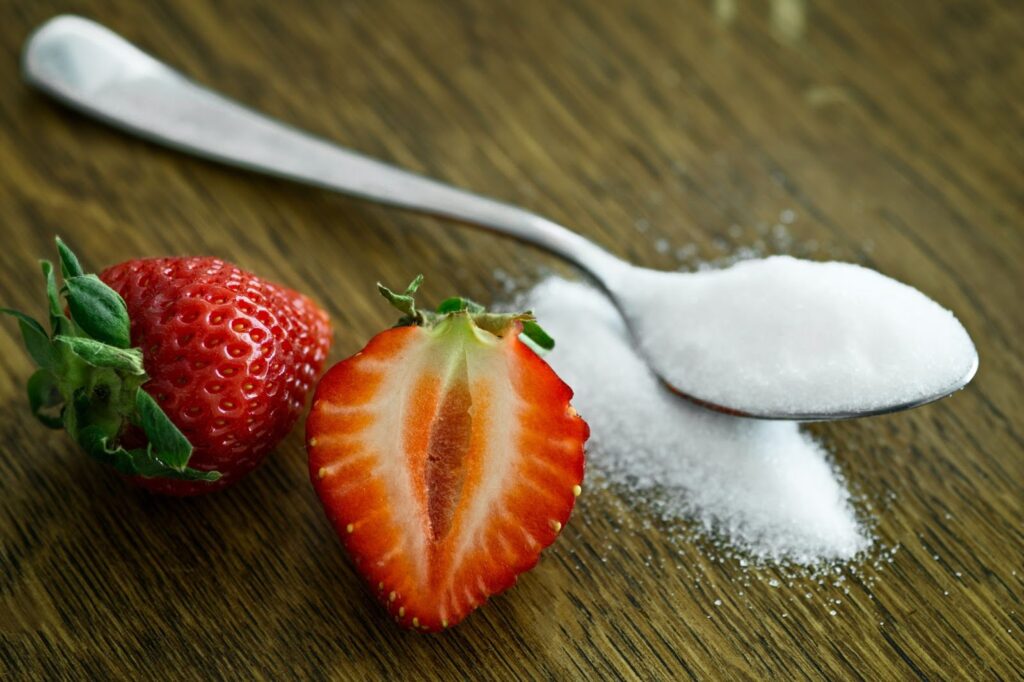In the modern diet, daily intake of sugar is considered to be the most unhealthy ingredient. With no added nutrients, it only provides calories. So, it is not suitable for your health. Especially in the long run, it can significantly damage your metabolism. If you consider overeating sugar, it is linked to weight gain and several other diseases such as heart disease, type 2 diabetes, and obesity.
But, the main question that arises is how much sugar is too much? To understand this well, it is essential to make a distinction specifically between natural sugars and added sugars, as discussed in the below section:
Differences Existing In Between Natural Sugars And Added Sugars
Sugars that occur naturally in foods such as vegetables and fruits are referred to as natural sugars.
These foods contain fiber, water, and many different micronutrients. Naturally occurring sugars do not harm your body. But, the same thing does not apply to added sugar.
What Is Added Sugar?
Added sugar is regarded as the main ingredient in most processed foods like baked products and soft drinks. It is found abundantly in candy. The most common added sugars are high fructose corn syrup and regular table sugar or sucrose.
If your main focus is to optimize your health and lose weight, then it is a great option to avoid those foods which contain added sugars. In this regard, you should remember that added sugars can also include natural sugars.
For example, if you consider adding honey to your oatmeal, then your oatmeal contains added sugar specifically from a natural source.
So, the sugar added to processed foods is much more harmful to your health when compared to the natural sugars present in whole foods such as vegetables and fruits.
Therefore, it is advised to refrain from consuming added sugars if you want to stay healthy.
Consumption Of Sugar Is Excessively High
According to a study conducted in the year 2008, people in the U.S. were found to consume more than 28 kg or 60 pounds of added sugar per day. It again does not include fruit juices.
In this case, the average sugar intake was found to be 76.7 gm per day. It equals 306 calories or 19 tsp of sugar.
This particular study also made it clear that between the years 2000 and 2008, sugar consumption was found to be decreased by about 23%. It is precisely because people choose to drink less sugar-sweetened beverages.
But, the current intake levels are still considered to be very high. In the year 2012, the average sugar intake was found to be 77 grams per day.
Excessive sugar consumption has been linked to several conditions like tooth decay, certain cancers, heart disease, type 2 diabetes, obesity, nonalcoholic fatty liver disease, and a lot more.
How Much Sugar Is Too Much: Recommended Daily Sugar Intake
The answer to this question is very complex. Some people can eat a lot of sugar without harm, whereas others should consider avoiding it as much as possible.
As per the American Heart Association or AHA, the maximum amount of added sugars to eat per day are:
- Female: 100 calories each day which is equal to 6 tsp or 25 gms
- Male: 150 calories each day which is equivalent to 9 tsp or 37.5 gms
To understand this well, 355 ml of Coke can contain about 140 calories from sugar, whereas a regular-sized Snickers bar contains 120 calories.
The U.S. dietary guidelines recommended people limit their sugar consumption to less than 10% of their day-to-day calorie intake.
So, you should necessarily avoid added sugars in the diet if you want to lose weight and stay healthy.
Not Addicted To Sugar? Then, Avoid It Completely
If you are not obsessed with sugar, then it is a good idea to avoid it altogether. It will help you to maintain a good lifestyle.
Highly processed and sugary foods stimulate the same areas of the brain as illegal drugs. So, this is a kind of addiction that can significantly hamper your health. For this particular reason, many people even lose control over their sugar consumption.
Even the addicted ones should focus on getting out of this addiction. This thing can be achieved if you try to decrease your sugar intake daily. Ultimately, you would be able to eliminate sugar from your diet.
Best ways to Minimize Sugars in your diet
To achieve this, you should consider limiting these foods as mentioned below:
Fruit Juices
The amount of the added sugar in fruit juices is considered to be very high. So, it is better to avoid these sugary fruit juices. Otherwise, it causes more harm to your body. Instead, you should go for canned fruit or whole fruit with no added sugar in it.
Soft Drinks
A 355 ml of soda can contains about 8 tsp of sugar. So, try to avoid the consumption of soft drinks to limit your sugar intake.
Baked Items
These include cakes, cookies, pies, and pastries. All of these food items are known to contain refined carbohydrates and sugar. So, it would help if you refrained from eating such food items to stick to a healthy routine.
Sweets And Candies
You should also try to limit your consumption of sweets.
Diet Or Low Fat Foods
Foods that are marketed as low fat or diet are often very high in sugar content. Instead of juices or soda, you should consider drinking water. Another important thing is to avoid adding sugar to your tea or coffee.
Also, you can substitute sugar with certain things such as nutmeg, cinnamon, vanilla, almond extract, lemon, or ginger in recipes. You can easily find many of the no-sugar recipes online. Some of the natural, best, and zero-calorie alternatives to sugar are monk fruit and stevia.
Final Verdict
At the day end, you should focus on figuring out how much sugar is considered suitable for you. Some people can effectively handle a little bit of sugar in their diet, while for others, it tends to cause rapid weight gain, binge eating, cravings, and disease.





 The Top Two Yoga Asanas that help Regulate your Blood Sugar
The Top Two Yoga Asanas that help Regulate your Blood Sugar